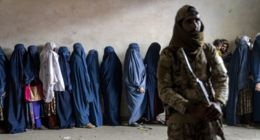International Women’s Human Rights Defenders Day 2024
29 NOV 2024
November 29 is not just another date on the calendar. It is a day to pause and recognize the extraordinary courage of women who put their lives on the line to defend human rights. International Women Human Rights Defenders Day sheds light on the sacrifices and contributions of women and gender-diverse individuals who challenge injustices across the globe.
1732873755.jpg)
November 29 is International Women Human Rights Defenders Day, a day to recognize and celebrate women, girls, and allies who stand up for human rights, gender equality, and social justice. It’s also a time to think about the challenges they face and show them our support. These defenders take on tough battles, fighting against unfair systems, harmful gender roles, and discrimination. They work for causes like ending gender-based violence and supporting LGBTQ+ rights. But this often puts them in danger—they face threats, harassment, violence, and even prison just for standing up for what’s right.This day is part of the 16 Days of Activism Against Gender-Based Violence, which runs from November 25 to December 10. It reminds us that fighting for human rights and gender equality go hand in hand.
This day emerged from the First International Consultation on Women Human Rights Defenders held in 2005 in Colombo, Sri Lanka. It highlighted how women defenders face unique threats, not only for their activism but also because of their gender. Sexual violence, societal discrimination, and targeted harassment are stark realities for many. The day stands as a call for collective action to support and protect these voices of change.
Women human rights defenders take on diverse roles, advocating for gender equality, indigenous rights, environmental protection, and more. Their work is transformative, but it comes with enormous risks. The assassination of Berta Cáceres in Honduras is a grim reminder of the dangers these defenders face. Cáceres, an indigenous leader, was murdered for protecting her community’s land from exploitation. Her story is just one among many.
Despite the threats, Malala Yousafzai, a name synonymous with courage and resilience, became a global symbol of the fight for girls' education. Growing up in the Swat Valley under the oppressive rule of the Taliban, she openly advocated for the right of girls to attend school. In 2012, Malala survived a brutal assassination attempt when a Taliban gunman shot her in retaliation for her activism.
Undeterred, she continued her mission on a global scale, co-founding the Malala Fund, which supports education initiatives in conflict zones and marginalized communities worldwide. Her efforts earned her the Nobel Peace Prize in 2014, making her the youngest recipient in history. Malala's story exemplifies the transformative power of standing up for education as a fundamental human right, despite overwhelming odds.

1732873756.jpg)
Berta Cáceres, Malala Yousafzai, Medha Patkar, Sonia Guajajara, Narges Mohammadi (from left to right)
In India, Medha Patkar has been a leading voice for the rights of marginalized communities, particularly those displaced by large scale infrastructure projects. As the founder of the Narmada Bachao Andolan, she has tirelessly fought against the displacement caused by the construction of dams on the Narmada River. Her activism has brought international attention to the plight of rural and indigenous populations uprooted by so called “development” projects.
In Brazil, WHRDs have been at the forefront of efforts to protect the Amazon Rainforest, often described as the “lungs of the Earth.” Women leaders from indigenous communities, such as Sônia Guajajara, have taken bold stands against illegal deforestation, mining, and exploitation of natural resources. Sônia, an indigenous activist and political leader, has been instrumental in amplifying the voices of Brazil’s indigenous peoples, who have faced centuries of marginalization. Her work involves advocating for sustainable environmental policies, combating climate change, and exposing the violence and human rights abuses against those defending their ancestral lands. These women risk their lives daily to protect the Amazon and its inhabitants from environmental destruction, often facing intimidation and violence from powerful vested interests.
Across the world, women defenders have transformed the fight for human rights. In Africa, WHRDs have been pivotal in combatting gender-based violence and promoting peace in post-conflict regions like the Democratic Republic of Congo. In the Middle East, women like Narges Mohammadi from Iran have led campaigns for political reform and gender equality, often enduring imprisonment and state repression. In Central America, women land defenders in Honduras and Guatemala have challenged multinational corporations encroaching on indigenous territories, drawing attention to the links between environmental degradation and human rights violations.
Their courage challenges oppressive systems and inspires movements worldwide. But their fight cannot be fought alone. Supporting these defenders means amplifying their voices, advocating for stronger protections, and funding organizations that provide them with legal and emotional support.
As we observe International Women Human Rights Defenders Day, it’s clear that the fight for justice is far from over. The stories of these women remind us that progress often comes with a heavy cost, and standing with them is not just an act of solidarity—it is an act of responsibility





















